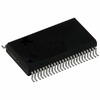Manufacturer Part Number
SN65LVDS9637DGK
Manufacturer
Texas Instruments
Introduction
The SN65LVDS9637DGK is a low-voltage differential signaling (LVDS) receiver designed by Texas Instruments, aimed at facilitating high-speed data transmission with low power consumption.
Product Features and Performance
Operates with a single 3V to 3.6V power supply
Dual LVDS receivers
Supports data rates up to 150Mbps
Low voltage differential signaling for reduced power consumption and high-speed data transmission
High impedance LVDS inputs when powered off
Device is ESD protected
Product Advantages
High-speed data transmission capability
Low power consumption enhances system efficiency
ESD protection improves product reliability
Suitable for operation in a wide range of temperature conditions (-40°C to 85°C)
Easy integration into existing systems due to surface mount packaging
Key Technical Parameters
Data Rate: 150Mbps
Voltage - Supply: 3V to 3.6V
Operating Temperature: -40°C to 85°C
Packaging Type: 8-TSSOP, 8-MSOP
Number of Drivers/Receivers: 0/2
Quality and Safety Features
Built-in electrostatic discharge (ESD) protection
Operates within industrial temperature ranges
Compliant with the LVDS standard for safe and reliable data transmission
Compatibility
Compatible with various LVDS protocols
Application Areas
High-speed data communication
Networking equipment
Telecommunication interfaces
Computer peripherals
Industrial control systems
Product Lifecycle
Status: Active
The SN65LVDS9637DGK is currently in active production with no indication of nearing discontinuation, ensuring availability for new designs and support for existing applications.
Several Key Reasons to Choose This Product
High-speed data transfer rate of up to 150Mbps suitable for demanding applications
Low power consumption ideal for power-sensitive projects
Robust ESD protection enhances durability and reliability
Supports a wide range of supply voltages (3V to 3.6V) for versatile use across different power environments
Active product lifecycle status ensures long-term availability and support




 SN65LVDS9638DGKTexas Instruments
SN65LVDS9638DGKTexas Instruments SN65LVDS94DGGTexas InstrumentsIC LVDS SERDES RCVR 56-TSSOP
SN65LVDS94DGGTexas InstrumentsIC LVDS SERDES RCVR 56-TSSOP SN65LVDS95DGGRTexas InstrumentsIC LVDS SERDES TX 48-TSSOP
SN65LVDS95DGGRTexas InstrumentsIC LVDS SERDES TX 48-TSSOP SN65LVDS9637DGNRG4Texas InstrumentsIC RECEIVER 0/2 8MSOPPOWERPAD
SN65LVDS9637DGNRG4Texas InstrumentsIC RECEIVER 0/2 8MSOPPOWERPAD